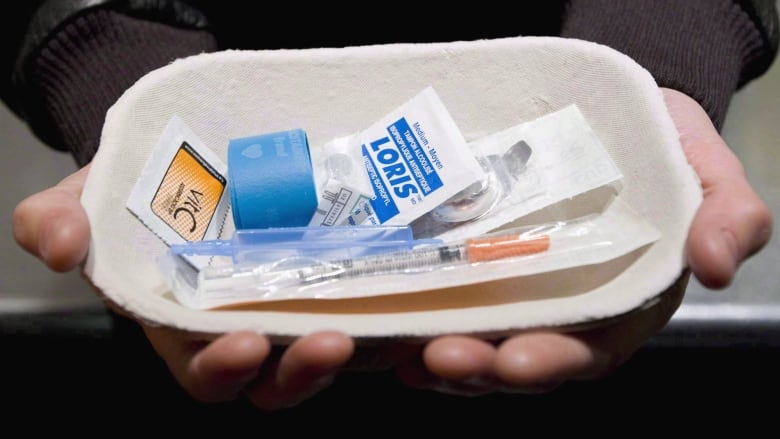City of Ottawa should support supervised injection, says medical officer of health
Public consultation should begin this summer, medical officer of health recommends in report to city

Ottawa's medical officer of health wants local agencies to "heed thewake up call" and find new models that canmake drug use safer for those withaddictions.
In areport to be tabled at the Board of Health'sJune 20 meeting,Dr.IsraLevy suggests Ottawa Public Health adopt a guiding principle tosupportsupervised injection sites, andevidence-backedproposals put forward by its community partners.
TheSandy Hill Community Health Centre is currentlylooking to set up the city's first such service at its Nelson St. location.
- Ottawa may need 'more than 1' drug injection site, city's top doctor says
- Sandy Hill Community Health Centre holdsconsultations on proposed supervised drug injection site
But Levyalso wants to consider other proven approaches to limiting the harm from drug use, such as machines introduced in European countriesthat dispense sterile syringes for a token.
"They could go to those dispensing units just as one might go to a bank machine, at times when we're not staffing a facility," said Levy.
Addictions remain 'a significant problem'
Data that accompanyLevy's report estimate that between 23,600 and46,900 peoplein Ottawa use illicit drugs (not including cannabis) or non-medical opioids.
Some 1,200 to5,600 people in Ottawa inject drugs, according to the report.
There will always be those who will keep using drugs because they are not ready or unable to change their lives, said Dr. Levy.
"What I'm really doing is calling on each of the agencies, including Ottawa Public Healthto heed the wake-up call that theepidemiology tell us is going on that westill have a significant problem in our community," said Levy.
The number of people addicted to drugsis not shrinking and current services aren't getting the job done, saidLevy.
"So, it behooves us all to reflect on what we can do within the constraints of the realities of our budgets and environments to do more, and not be limited by a lack of imagination."
After the board meeting, Ottawa Public Health will launch an online survey about supervised injection services, and harm reduction more generally, followed by consultation sessions later in the summer and fall.
Other cities considering sites
The Insite facility in Vancouver, which opened in 2003, has long been theonly supervised injection site in the country, but Levy notes in his reportthatcouldsoon change.
A 2011Supreme Court decision that granted Insite an exemption so that its clients would not be charged for possessing illegal drugs has led agencies in other cities to seek the same exemption.
Toronto is considering three such sites and Montreal is also pursuing one, Levy wrote in his report.
- Toronto needs safe injection sites, top health official says
- Safe injection sites have potential to save lives, says Jane Philpott
- Opiate-blocker naloxone delisted by Health Canada, could soon be available without prescription
Ottawa's Sandy Hill Community Health Centre also hopes to create this city's first supervised injection site, so the director of its Oasis program,Rob Boyd, welcomed the medical officer of health's report.
"We're kind of first out of the gatehere at our centre in terms of really feeling this is a priority that we need to move on now," he said."But we need more than one supervised injection service here in Ottawa. People will not travel large distances to use aninjection service."
Mayor, police chief have opposed sites
Mayor Jim Watson, meanwhile,has longspoken out against allowing supervised injection sites in Ottawa,suggesting money would be better spent on treating those with addictions.
The police chief also has expressed concerns about public safety around such sites.
Levy said, on the whole,he can respect those who cannot accept that some people will inject into their bodies a substance that is unhealthy.
He doesn't agree with it either, but says the alternative is also an abomination.
"The alternative is to turn a blind eye and to have these people leave our care and go off alone into the night and struggle alone," said Levy.
"Forme, that's a bigger issue and one I can't really live with."












_(720p).jpg)


 OFFICIAL HD MUSIC VIDEO.jpg)
.jpg)



























































































